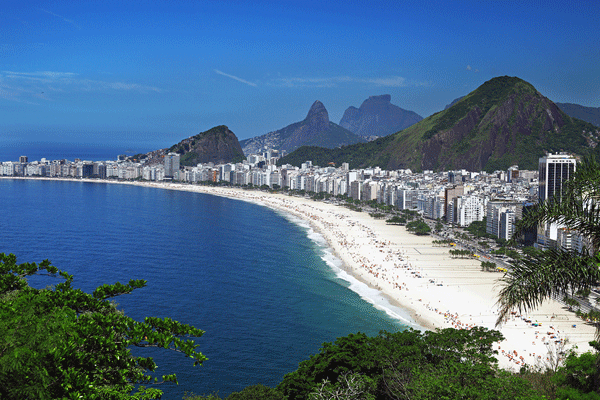Educational System in Brazil
Summary: The one tip that you hear expats living in Brazil repeatedly sharing with newcomers is not to buy a home when you first move to Brazil. Rent for a few months or longer so that you have time to find the right neighborhood. Give yourself time to ensure that Brazil is right for you for the long term. If you've already taken time to do those things and are ready to take the plunge and become a property owner, here are tips about buying a home in Brazil.

Understanding the educational system of a new country can be a daunting task for expats. This guide aims to provide a comprehensive overview of the educational system in Brazil, including the main stages of education, the process of enrolling children in school, language requirements, the availability of bilingual schools, types of private schools, and the options for homeschooling and online schooling. Whether you're considering public or private education for your children, this guide will help you navigate the Brazilian educational landscape.
What are the main stages of education in Brazil?
The Brazilian educational system is divided into three main stages: Fundamental Education (Ensino Fundamental), Secondary Education (Ensino Médio), and Higher Education (Ensino Superior). Fundamental Education is further divided into two stages: Fundamental I (for children aged 6-10) and Fundamental II (for children aged 11-14). Secondary Education is for students aged 15-17, while Higher Education includes undergraduate and postgraduate studies.
Fundamental Education I and II
Fundamental Education I, for children aged 6-10, focuses on basic literacy, numeracy, and social sciences. Fundamental Education II, for children aged 11-14, expands on these subjects and introduces more complex topics in sciences, mathematics, and humanities. Both stages aim to develop critical thinking and problem-solving skills.
Secondary Education
Secondary Education, for students aged 15-17, prepares students for higher education and the job market. It includes a broad curriculum with subjects like Portuguese, Mathematics, Physics, Chemistry, Biology, History, Geography, English, and Physical Education. At the end of this stage, students take a national exam (ENEM) which is used for university admission.
How does a newcomer from a different country enroll their kids in school?
To enroll your child in a Brazilian school, you will need to provide a birth certificate, proof of residence, and a transfer certificate from the previous school. If the documents are in a foreign language, they must be translated by a sworn translator. It's also important to note that the Brazilian school year runs from February to December, so it's best to plan the enrollment process accordingly.
Can my children enroll in a public school if they are still learning Portuguese?
Yes, children who are still learning Portuguese can enroll in public schools in Brazil. However, they may need additional language support, as the medium of instruction in most schools is Portuguese. Some schools offer Portuguese as a Second Language (PSL) programs to help non-native speakers.
Are there public bilingual schools?
While most public schools in Brazil are Portuguese-speaking, there are a few public bilingual schools, particularly in larger cities like São Paulo and Rio de Janeiro. Admission to these schools is usually competitive and may require a proficiency test in the second language.
What types of private schools are common in Brazil?
Private schools in Brazil include Catholic schools, international schools, and bilingual schools. International schools often follow the curriculum of their home country and are popular among expats. Bilingual schools offer instruction in both Portuguese and a second language, usually English.
Do expats typically send their children to public or private school?
Many expats in Brazil opt for private education due to the language barrier and perceived higher quality of education. International schools, in particular, are popular as they offer a familiar curriculum and language of instruction.
How expensive are Private schools in Brazil?
The cost of private schools in Brazil can vary widely, depending on the type of school and location. International schools are typically the most expensive, with annual fees ranging from $5,000 to $30,000 USD. Other private schools may charge between $1,000 and $5,000 USD per year.
Are you allowed to homeschool while living in Brazil?
As of 2018, homeschooling is not officially recognized in Brazil and is considered illegal. However, there is ongoing debate about this issue, and the situation may change in the future.
May kids attend online school instead of a local school while living in Brazil?
Online schooling is not widely recognized in Brazil, and it's recommended to check with the local education authorities before opting for this route. However, due to the COVID-19 pandemic, many schools have adapted to offer remote learning options.
About the Author
 Joshua Wood, LPC joined Expat Exchange in 2000 and serves as one of its Co-Presidents. He is also one of the Founders of Digital Nomad Exchange. Prior to Expat Exchange, Joshua worked for NBC Cable (MSNBC and CNBC
Primetime). Joshua has a BA from Syracuse and a Master's in Clinical and Counseling Psychology from Fairleigh Dickinson University. Mr. Wood is also a licensed counselor and psychotherapist.
Joshua Wood, LPC joined Expat Exchange in 2000 and serves as one of its Co-Presidents. He is also one of the Founders of Digital Nomad Exchange. Prior to Expat Exchange, Joshua worked for NBC Cable (MSNBC and CNBC
Primetime). Joshua has a BA from Syracuse and a Master's in Clinical and Counseling Psychology from Fairleigh Dickinson University. Mr. Wood is also a licensed counselor and psychotherapist.
Some of Joshua's articles include Pros and Cons of Living in Portugal, 10 Best Places to Live in Ireland and Pros and Cons of Living in Uruguay. Connect with Joshua on LinkedIn.
Additional Information:
- Brazil Guide
- Healthcare & Health Insurance in Brazil
- Members Talk about Healthcare & Health Insurance in Brazil
- Best Places to Live in Brazil
- Real Estate in Brazil
- Guide to Real Estate in Brazil
- Pros & Cons of Living in Brazil
- Cost of Living in Brazil
- Understanding Mental Health in Brazil
- Is Health Insurance Required When Moving to Brazil?
- Having a Baby in Brazil
- Health Insurance in Brazil
- 2025 Guide to Living in Brazil
- Pros and Cons of Living in Brazil 2025



